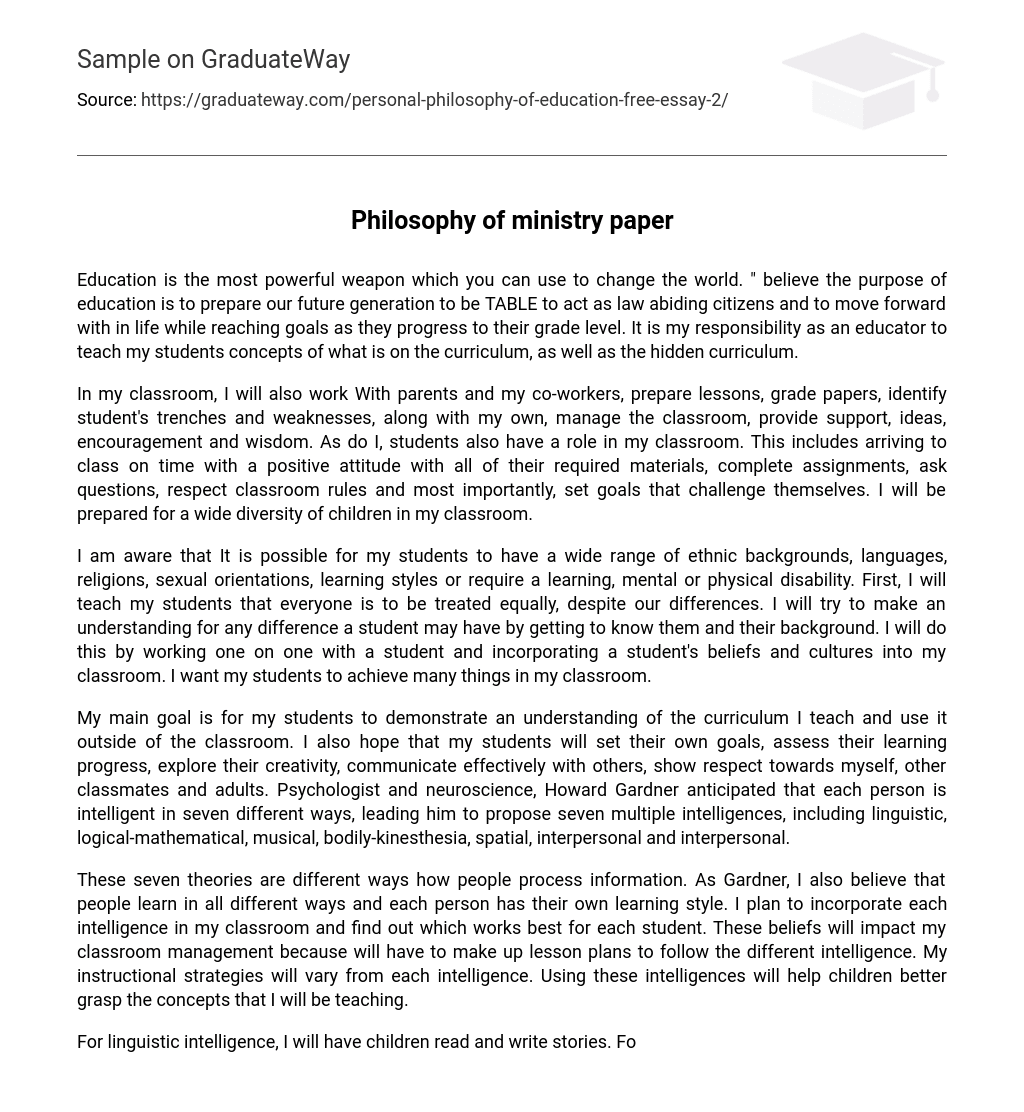Education is a powerful tool for transforming the world. I believe that its purpose is to equip future generations with the skills needed to become law-abiding citizens and achieve their goals as they progress through school. As an educator, it is my responsibility to teach students not only the subjects outlined in the curriculum but also the implicit lessons embedded within it.
In my classroom, I will work together with parents and colleagues to coordinate lessons, assess student work, and identify strengths or challenges. Additionally, I will oversee the management of the classroom while offering assistance, suggestions, motivation, and guidance. It is important for students in my class to meet certain expectations including punctuality, a positive attitude, preparedness with materials, completion of assignments, seeking clarification when needed, respectful adherence to rules and most importantly setting ambitious goals for themselves. I am fully capable of providing support tailored to the needs of a diverse group of students in my classroom.
Recognizing and valuing the diversity of my students is crucial to me. This includes acknowledging their ethnicities, languages, religions, sexual orientations, learning styles, and any learning, mental, or physical disabilities they may have. I am committed to promoting equality among all individuals regardless of our differences. To cultivate understanding and acceptance, I will form personal connections with each student and become familiar with their individual backgrounds. In doing so, I will ensure that their beliefs and cultures are incorporated into our classroom environment. Ultimately, my objective is to establish an inclusive setting where all my students can prosper.
My main goal is to help my students understand and apply the curriculum in real-life situations. Additionally, I want them to set personal goals, assess their progress, showcase their creativity, communicate effectively with others, and show respect towards me, their peers, and adults.
Psychologist and neuroscientist Howard Gardner proposed that people have intelligence in seven different forms called multiple intelligences. These include linguistic, logical-mathematical, musical, bodily-kinesthetic, spatial, interpersonal, and intrapersonal intelligences.
These seven theories represent diverse approaches to information processing. Like Gardner, I also share the belief that individuals learn in unique ways and possess their own learning style. To accommodate this, I intend to integrate each intelligence into my classroom and determine which approach works most effectively for each student. These convictions will influence my classroom management as I will need to create lesson plans tailored to the different intelligences. Consequently, my instructional strategies will differ depending on the specific intelligence being addressed. By incorporating these intelligences, children will have a greater understanding of the concepts I aim to teach.
To foster linguistic intelligence, I will encourage children to engage in reading and writing stories. For logical-mathematical intelligence, they will be encouraged to create various visual aids such as graphs, maps, timetables, and puzzles. In terms of musical intelligence, children will be encouraged to compose songs that explain concepts. To enhance bodily kinesthetic intelligence, I will design scavenger hunts and encourage children to create unique dances. Spatial intelligence will be developed through activities that involve drawing, painting, and sculpting. Lastly, interpersonal intelligence will be nurtured as children work in groups and teach each other problem-solving techniques.
In order to foster interpersonal intelligence, I will encourage children to reflect on their learning and experiences through journaling and give them the flexibility to work at their own pace. Additionally, I will evaluate and assist each student individually. I will cultivate respectful relationships with parents, colleagues, and administration by volunteering outside of the classroom when necessary, seeking and offering advice to fellow teachers and administrators, and maintaining regular communication with parents to keep them updated on their child’s progress in my class.





